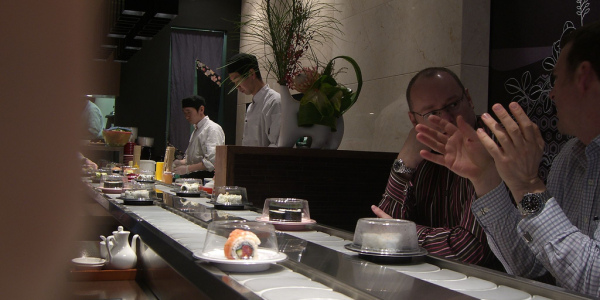Automation is the norm in many industries, but now the restaurant industry is looking to capitalize on it as well. Restaurants all across the globe are pulling employees and plugging in automation.
Japan has long been at the forefront in automation and robotics, so it comes as no surprise that they have some of the most advanced automated systems in the restaurant industry. Conveyor belts in some Japanese eateries carry food throughout the restaurant, allowing diners to select whichever dish looks most appetizing. If diners don’t like the idea of a food carousel, they can special order from a touch screen menu and food is delivered on a direct line to the table via a speedy little food bullet train.
So there is a conveyor belt that will carry food to people. That’s cool and all, but it’s not like there are robots making the food. Well, actually there are.
Japan has automated sushi robots that are capable of making 3,600 pieces of sushi in an hour! Japan’s automated food industry has grown 50% in the last 10 years in while their traditional food industry has floundered.
China has been putting noodle chopping robots to work. These robots can slice noodles more than twice as fast as human cooks. They’re growing in popularity because they are faster, they don’t get sick, they don’t make mistakes, and they don’t have to be paid. But these automated noodle bots can’t replace an entire work force, they are designed to aid noodle chefs and facilitate their work.
The U.S. is looking to automate the food industry as well. Fast food chains like KFC, Taco Bell, Jack in the Box, Burger King and McDonalds have all started using self-ordering touch screen kiosks. You can walk in to a restaurant, select your items on the screen, and pay at the kiosk without even speaking to an employee.
Chili’s and Applebee’s have been introducing a similar way of ordering food at their restaurants. However, rather than kiosks you’re supplied with a tablet to order your food and drinks. These tablets also come with games and apps that you can access for a fee.
Darren Tristano is the executive vice president of Technomic, which is a research group that focuses on the restaurant industry. He says that automation in the food industry increases accuracy, speed of service, and reduces labor costs. Labor can account for 30% of costs in the food industry, so automation can prove to be incredibly beneficial.
Lower costs and increased speed and accuracy are exactly why automation is important to any industry.
If your legacy Indramat components need support, we’re the ones to call. We have the largest stock of factory refurbished exchange units in the U.S., and expert support by phone, mail, or chartered plane. Call (479) 422-0390 for immediate assistance.
